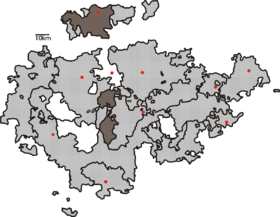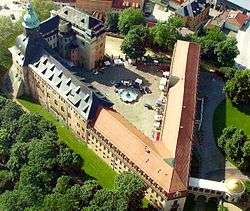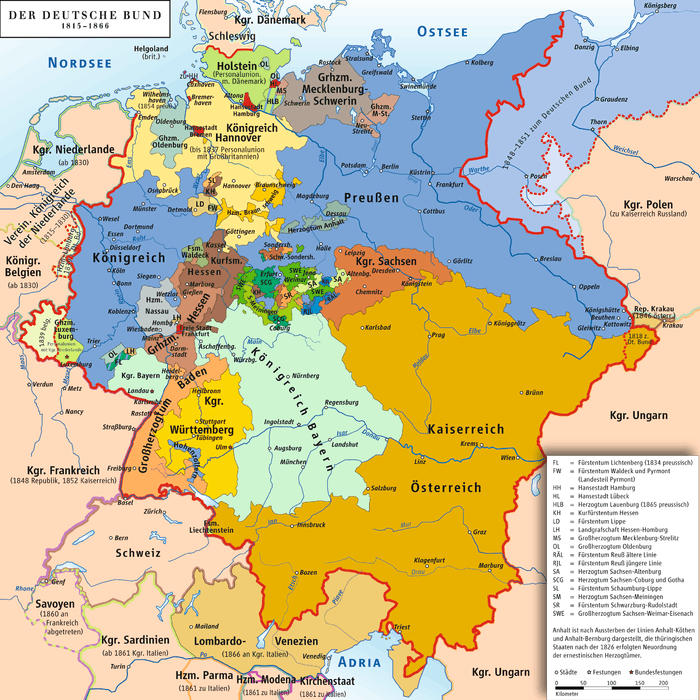Schwarzburg-Sondershausen
| County (Principality) of Schwarzburg-Sondershausen | ||||||||||
| Grafschaft (Fürstentum) Schwarzburg-Sondershausen | ||||||||||
| State of the Holy Roman Empire, State of the Confederation of the Rhine, State of the German Confederation, State of the North German Confederation, State of the German Empire, State of the Weimar Republic | ||||||||||
| ||||||||||
 Flag
 Coat of arms
| ||||||||||
.svg.png) Schwarzburg-Sondershausen within the German Empire | ||||||||||
 Schwarzburg-Sondershausen within Thuringia | ||||||||||
| Capital | Sondershausen | |||||||||
| Government | Principality | |||||||||
| Historical era | Middle Ages | |||||||||
| • | Partitioned from Schwarzburg |
1599 | ||||||||
| • | Raised to Principality | 1697 | ||||||||
| • | German Revolution | 1918 | ||||||||
| • | Merged into Thuringia | 1920 | ||||||||
| Area | ||||||||||
| • | 1905 | 862 km2 (333 sq mi) | ||||||||
| Population | ||||||||||
| • | 1905 est. | 85,000 | ||||||||
| Density | 99/km2 (255/sq mi) | |||||||||
| ||||||||||


Schwarzburg-Sondershausen was a small principality in Germany, in the present day state of Thuringia, with its capital at Sondershausen.
History
Schwarzburg-Sondershausen was a county until 1697. In that year, it became a principality, which lasted until the fall of the German monarchies in 1918, during the German Revolution of 1918–1919. After the German Revolution, it became a republic.
In 1920, it joined with other small states in the area to form the new state of Thuringia. Schwarzburg-Sondershausen had an area of 862 km² and a population of 85,000 (1905). Towns placed in the state were: Arnstadt, Sondershausen, Gehren, Langewiesen, Großbreitenbach, Ebeleben, Großenehrich, Greußen and Plaue.
Rulers of Schwarzburg-Sondershausen, 1552–1918
Counts of Schwarzburg-Sondershausen
- 1552–1586 John Günther I
- 1586–1631 Günther XLII, with Anton Henry, John Günther II and Christian Günther I
- 1631–1638 Günther XLII, with Anton Henry and Christian Günther I
- 1638–1642 Günther XLII, with Christian Günther I
- 1642–1643 Günther XLII, with Anton Günther I
- 1643–1666 Anton Günther I
- 1666–1697 Christian William, with Anton Günther II
Raised to Principality in 1697
Princes of Schwarzburg-Sondershausen
- 1697–1716: Anton Günther II
- 1697 – 10 May 1721: Christian William
- 10 May 1721 – 28 November 1740: Günther XLIII
- 28 November 1740 – 6 November 1758: Henry XXXV
- 6 November 1758 – 14 October 1794: Christian Günther III
- 14 October 1794 – 19 August 1835: Günther Friedrich Karl I
- 19 August 1835 – 17 July 1880: Günther Friedrich Karl II
- 17 July 1880 – 28 March 1909: Karl Günther
United under Prince Günther Victor of Schwarzburg-Rudolstadt
- 28 March 1909 – November 1918: Günther Victor
Heads of the princely house of Schwarzburg
On the death of the childless Prince Günther Victor in 1925, he was succeeded by Prince Sizzo (1860–1926), who was the son of Prince Friedrich Günther (1793–1867) from his second, morganatic marriage. Prince Sizzo was recognised as a full member of the House of Schwarzburg in 1896. He was succeeded in 1926 by his son, Prince Friedrich Günther (1901–1971).
Upon the death in 1971 of Prince Friedrich Günther, the last in the male line, under Semi-Salic primogeniture his elder sister, Princess Marie Antoinette of Schwarzburg, who married Friedrich Magnus V, Count of Solms-Wildenfels, may have had a claim to the headship.[1] [2]
- 1918–1925: Prince Günther Victor (1852–1925)
- 1925–1926: Prince Sizzo (1860–1926)
- 1926–1971: Prince Friedrich Günther (1901–1971)
- 1971-1984: Princess Marie Antoinette of Schwarzburg (speculative)
- 1984: Friedrich Magnus, Count of Solms-Wildenfels (speculative)
Villages with more than 2000 people
| Village | Inhabitants December 1, 1910 |
|---|---|
| Arnstadt | 17,841 |
| Sondershausen | 7759 |
| Langewiesen | 3814 |
| Greußen | 3348 |
| Großbreitenbach | 3255 |
| Gehren | 2917 |
| Geschwenda | 2291 |
See also
References
- ↑ The House of Schwarzburg on Heraldica.org
- ↑ James, John Almanach de Gotha, Volume I, 2013.
External links
 Chisholm, Hugh, ed. (1911). "Schwarzburg-Sondershausen". Encyclopædia Britannica (11th ed.). Cambridge University Press.
Chisholm, Hugh, ed. (1911). "Schwarzburg-Sondershausen". Encyclopædia Britannica (11th ed.). Cambridge University Press.




-de.svg.png)